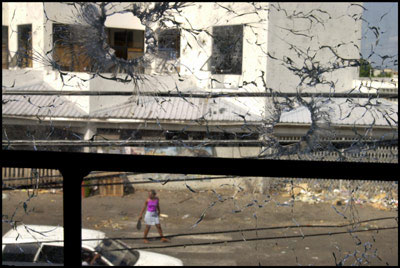
It appears as if the 'Jewel of the Caribbean' just got a little more of its glitter back. Yes, the always quirky Jamaica has elected its first female president, in the same semi-acclaimed style as Canada did Kim Campbell in 1993.
Progressive, you ask? Well yes, but seeing as hundreds have died over the electoral process since the 1990s, the fact that any change in government happened peacefully is a step forward for a country that's always had an interesting take on its colonist's parliamentary democracy. Such is the cycle of death and resurrection that the island always seems to be enduring. Anyone who's been there will admit it's an aesthetic and musical paradise on earth, but the nation's soul has always been tortured by a series of foreign captors.
The isle gained independece in 1962, and prospered. Buoyed by cheap oil and good prices for its exports (mostly bauxite, sugar and bananas), its currency was worth more than America's and was one of the International Monetary Fund's star pupils, exploiting its competitive advantages in primary industry. It was awash with foreign investment and hope for the future until the 1973 Oil Crisis increased the price of energy imports and ruined much of the Keynesian (state-guided) progress that most of the third world had made to that point. All of a sudden, Jamaica couldn't pay back its loans, could only grow sugar and bananas (hard to subsist on) and had nothing much to sell on the world market. It borrowed more and more just to pay off the interest on their loans and found itself in a downward spiral of debt. It devalued its currency, diverted money from social programs to loan repayment and began a disastrous system of political patronage within its poor communities. Today, 1 US dollar is worth 65 Jamaican J's (yes, that's really what it's called), and the capital, Kingston, has the highest murder rate of any city in the world, for both civilians and police officers. It's also become a major transshipment point for cocaine coming from South America to the US. This trade fuels many of the problems that currently plague Jamaican democracy.
When inner city gangs started to make a lot money selling drugs within Jamaica and shipping them abroad, they reinvested the profits into community development to win local support. The 'Don' of each slum community is an enormously respected and well-armed man. Though he's a thug who's likely murdered several rival gang members, he's also likely built schools and given families money for tuition and uniforms (public education isn't free there). Obviously, the gangs couldn't form a legitimate political party, so they began to court Jamaica's big political parties, the PNP and JLP, to give the gangs money in exchange for the residents of the gangs' respective slums to vote for whichever party. In doing so, the parties threw democracy to the wolves. Candidates often win their ridings with 100 percent of the vote, as anyone who votes against the gang's party fears violence. And with these highly politicized enclaves right beside each other in the seething West end of Kingston, the internecine killing is why so many people get shot in Jamaica.
But, as I said, Jamaica is a queer place, no pun intended. It's brashly homophobic but is widely considered to be matriarchal society. I can't even think of another nation that's considered matriarchical, let alone woman-loving and gay-hating at the same time. Now its political system, after so many years of disrepair, looks like it's undergoing something of a rebirth. In 2002, when I was in Jamaica for two weeks prior to the national election, the expected violence never came. Trenchtown, Bob Marley's birthplace and Jamaica's most notorius slum, was bitterly divided, but in a good way: the former JLP stronghold was divided evenly between PNP and JLP support. While this plurality means nothing of the political tastes of Jamaicans (the two parties are almost ideologically identical), the fact that there was even a split vote was a step forward. And now that a woman's in charge, something most Jamaicans are used to, hopefully she can bring some sort of unity to a bitterly divided population. If she can, the nation's altruistic motto, "Out of many, one people" will finally be more than another failed colonial pipe dream.
2 comments:
Wow, you know a lot about Jamaica. I'm impressed.
Why's it hard to reconcile a place being homophobic and matriarchal at the same time? That assumes the voters (in the party, in this case) made the choice to elect a female because they had a progressive mindset.
I don't know a lot (or anything) about Jamaica but is the matriarchy borne out of a progressive sentiment or is it just the traditional culture of Jamaican people?
I know that when Sri Lanka elected its first female leader (decades ago!) it wasn't out of any concern for gender equality, it was a sympathy vote because her husband (the last PM) had been assassinated. So maybe we shouldn't assume that the election of a female leader correlates to a forward-thinking population.
Again, I don't really know anything about Jamaica so maybe i'm wrong. Interesting post, anyways. I didn't know the gangs were that involved in politics.
Oh and when I glanced at your msn name I thought the address was brandons hot currie, clearly you need to make that the new name.
Post a Comment